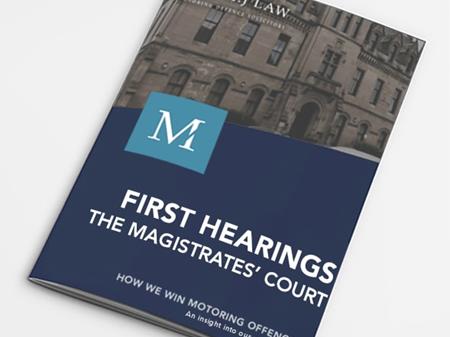Drink Driving Blood Test
A positive blood result does make you guilty of drink driving. The law surrounding evidential blood samples is extremely strict. If the police have failed to follow the correct procedure, you could avoid a conviction.
We can help you with:
- Identifying unreliable results
- Challenging police procedure
- Avoiding disqualifications
- Next steps
Drink Driving
Blood Alcohol Tests
You may be surprised to learn that you do not have an automatic right to give a blood sample at the police station, even if you ask for it. Section 7(3) Road Traffic Act 1988 says that a blood specimen can only be requested in the following circumstances;
- If the breath test machine gives an unreliable indication of alcohol
- If you cannot give breath due to a medical condition
- If there is no breath test machine available for use
The police cannot charge you with drink driving before the results of the blood test have been obtained, even if your roadside reading was high. You will be released under investigation until the results come back, and do not usually have to return to the police station (unless the police want to interview you). Blood tests can take anywhere from 8 weeks to 6 months. You can continue to drive over this period, unless the police tell you otherwise.
If you’re over the limit, you’ll receive a postal requisition (a postal charge). This should also include an SFR1 (Streamlined Forensic Toxicology Report) confirming the test results. Most police forces fail to include this within the envelope.
Delay in analysing the sample
Due to it becoming common practice for the police to leave blood samples lying around, the government commissioned an investigation by the HM Inspectorate. The report advised that blood samples be sent to the laboratory within one week of being taken.
The report, however, seems not to have reached the police, as it is now more common for samples to remain at police stations for up to 3 weeks before being sent to the laboratory.
The issue here is that blood is an organic material and will decompose overtime. A consequence of this is that alcohol is created in the blood (a process known as fermentation). Every time a refrigerator door is opened, the temperature inside the fridge will fluctuate. This can disturb the stability of the specimen and may speed up the fermentation process.
One way to prevent fermentation is to add a preservative to the sample, such a sodium fluoride. This should be added by the nurse/doctor who takes the blood sample. Do you remember seeing them add anything to the sample? If not, the sample may have increased in alcohol concentration before it reached the lab. To make matter worse, the laboratories instructed by the police do not test for preservative! This means that if the nurse/doctor failed to add the preservative, no one will know.
Streamlined Forensic Toxicology Report (SFR1)
If your sample is above the prescribed limit, you will be charged and sent to court. The first court hearing is particularly important; it is the first opportunity you will have to review the evidence against you and enter a plea with the court.
At the first court hearing the CPS should provide a report confirming the results of the blood test, known as the MG22(b) or ‘Streamlined Forensic Toxicology Report (SFR1)’. This report should contain all the relevant technical information that we would need to check, including:
- The method of analysis – Was the method ISO approved?
- A unique barcode and for tracing & continuity purposes – Do these results actually belong to you?
- The condition of the sample and its packaging upon receipt – Has it been tampered with or damaged?
- The date the sample was received by the laboratory – How long was it stored at the police station before postage?
- The amount deducted from the sample for analytical variation – Has the result been reduced to reflect the margin for error?
- The level of alcohol found in the sample – Is it consistent with your alcohol consumption, or does it seem high?
- The name of the laboratory where the sample was tested – Has this laboratory been accused of tampering like others have?
Any inconsistencies or discrepancies with the report would quickly be highlighted to the prosecutor, who may agree immediately to drop the case. Alternatively, we may decide to keep the issue quiet and raise it at a later date when it would do more damage to the CPS’s case.
The Streamlined Forensic Reporting Protocol is a relatively new method of introducing forensic evidence. It was introduced as a cost cutting measure. Our team regularly win cases because the police and CPS fail to understand the requirements of the protocol and the obligations it places on them. We would be pleased to discuss this with you.
What does an SFR1 look like?
Take a look at the example below. The SFR1 was purposely designed to look official so as to encourage defendants to plead guilty. In reality, it is a standardised template that proves very little. It could even be used to win your case.
If you look closely, you’ll see that you have 14 days to respond to the SFR1 and confirm whether it is disputed. You can do this in writing or you can wait until your first court hearing (so long as it is within the 14 days!). This is arguably one of the most important steps that you can take to win your drink driving case. By rejecting the SFR1, we force the CPS to produce additional forensic evidence (known as an SFR2 and the Analytical Data Pack). The purpose of the SFR2 (Stage 2 report) is for the police laboratory to address any concerns that we have raised with the SFR1. Below are some of the most common reasons that we reject Stage 1 reports;
- The amount of alcohol consumed could not account for the reading provided (this is the most common reason) and immediately allows any defendant to reject the SFR1
- The alleged offence took place over 2 months ago (or longer). We are concerned that the blood sample has remained at the police station during this time. Police station storage facilities are not suitable for long-term storage of forensic samples
- If the sample was not tested within 2 weeks, it may have deteriorated
- The SFR1 does not include photos of the tamper-proof evident bag
- The laboratory analysing the sample fails to undertake regular proficiency testing
- The laboratory analysing the sample has failed to make a deduction for analytical variation
Tip. If you haven't received the SFR1, don't reject it. The CPS cannot prove its case against without this document. Sometimes staying quiet is the best strategy!
The next step is to sit and wait. The CPS are usually given 28 days to serve the SFR2.
A lot of the strategies that we use to defend drink driving cases are designed to set the CPS 'up to fail'. What ever the reason, the CPS regularly fail to serve the correct evidence in time. Once the inevitable happens, we have to persuade the court kick the case out.
Excluding the evidence and winning the case
The Criminal Procedure Rules (CPR) is a 777 page document that sets out the procedure in criminal cases. Any party that fails to comply with the CPR could face serious consequences. The section that we are most interested in for these purposes is Part 19.

Part 19 contains all of the rules relating to expert evidence. Any party seeking to rely on expert evidence in a drink driving case must have regard to Part 19, including the CPS. So, what does Part 19 tell us about the SFR2?
Firstly, it tells us what the SFR2 must contain in order to comply with Part 19. The SFR2 must contain;
- details of the expert’s qualifications, relevant experience and accreditation
- details of any literature or other information which the expert has relied on in making the report;
- say who carried out any examination, measurement, test or experiment which the expert has used for the report
- contain a summary of the conclusions reached
- contain the same declaration of truth as a witness statement.
It also tells us that we can access all of the technical data upon which the SFR2 was produced (known as the Analytical Data);
if another party so requires, give that party a copy of, or a reasonable opportunity to inspect (i) a record of any examination, measurement, test or experiment on which the expert’s findings and opinion are based... .
It tell us that the SFR2 must be served "as soon as practicable following a not-guilty plea" and, finally, it tells us what happens if the CPS fail to serve the SFR2 in time:
Unless the parties otherwise agree or the court directs, a party may not— (a) introduce expert evidence if that party has not complied with paragraph (3); (b) introduce in evidence an expert report if the expert does not give evidence in person.
The section above is by far the most significant; the CPS cannot introduce, into evidence, the SFR2 unless 'both parties agree' (which we clearly won't), 'or the court directs' (which it won't - unless the CPS has a good excuse as to why the SFR2 was late...and we are yet to hear one!). The court's hands are tied and evidence is not admissible. Once the SFR2 is excluded, it's game over for the CPS.
A huge number of cases that we defend will fail because the CPS never present the correct evidence against our clients. The process outlined above has been simplified and is not a do-it-yourself guide. Our solicitors have tried and tested hundreds of technical and procedural defences. We have been able to refine our approach and maximise case victories.
If you would like to speak with us about your case, get in touch:
0151 422 8020
How else do we win cases?
If any of the following applies in your case, you should call us immediately;
- More than one sample of blood was taken from you
Remember that, by law, the officer can only 'require' a single sample of blood. If there were various unsuccessful attempts to draw blood, small amounts may have been collected. - The officer did not inform you that the blood test was optional
The MGDDB procedure is by far one if the most important parts of the case against you. We would always recommend that you review this evidence. - You were not given part of your own blood sample to take home
The law requires an officer to supply you with part of your sample if requested. Can the police prove that you left the station with it? - You were not witnessed driving the vehicle
The police may not be able to prove that you drove the vehicle. If you think there are witnesses, how reliable will their evidence be? Will they want to come to court to give evidence against you? - You suffer with depression, anxiety or any form of mental illness
These can all amount to defences in law. - You consumed alcohol after driving the vehicle
Post driving consumption of alcohol is a complete defence. Read more here.
Drink Driving Blood - SENTENCE
| Blood alcohol level | Starting point | Disqualification | Disqualification (2nd offence) |
|---|---|---|---|
| 81 - 137 | Band C fine | 12 – 16 months | 36 - 40 months |
| 138 - 206 | Band C fine | 17 – 22 months | 36 - 46 months |
| 207 - 275 | Community Service | 23 – 28 months | 36 - 52 months |
| 276 - 345> | 12 weeks custody | 29 – 36 months | 36 – 60 months |






